The OCLC Holdings Manager is a project posted to GitHub as a licensed open source solution for any library in the world to download and use or improve upon. SWAN designed OCLC Holdings Manager (OHM) with OCLC Developer Network using the WorldCat Metadata API. The system is responsible for updating 25 million WorldCat holdings annually, which is 25% of the 104 million holding records for Illinois. The basics of how it works is described on the introductory readme.md of the Github project:
OCLC Holdings Manager is a rule-based utility that analyzes MARC21 extracts and determines changes between datasets. This comparison is then used to set and unset WorldCat holdings using the OCLC WorldCat Metadata API. OHM was designed to be consortia ready, but should work just fine for standalone libraries as well.
(See Github readme.md)
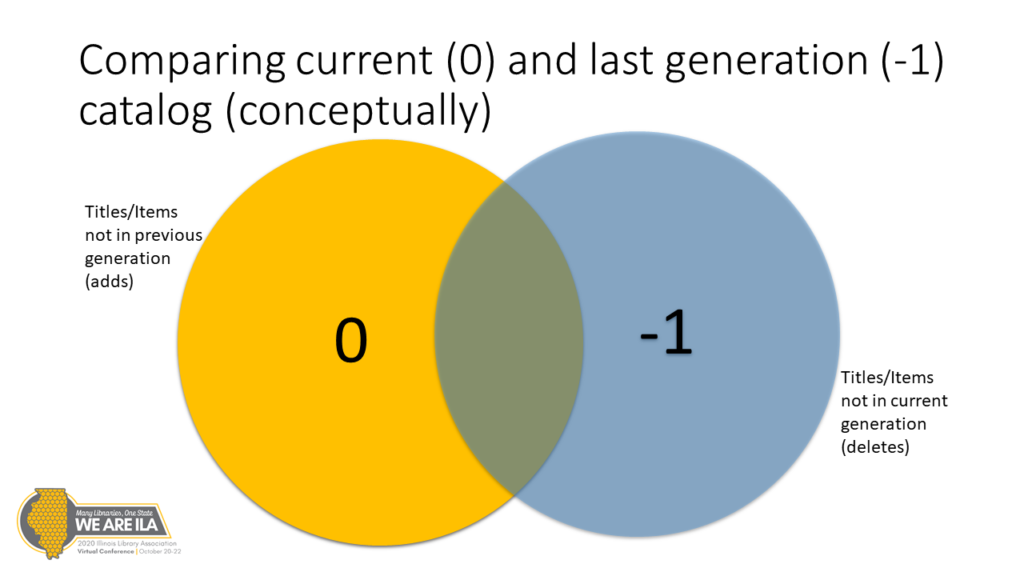
Why are setting holdings in WorldCat important?
WorldCat is the largest union catalog of library collections in the world. The ability to find and request items from reciprocating libraries within WorldCat is an amazing feat of library cooperation and leadership. Library users can search for any material eligible for lending and makes nationwide resource sharing possible. Having an accurate inventory of the library’s collection and the WorldCat system sets up efficiencies in WorldShare ILL and real-time availability (something else SWAN has accomplished).
Some library consortium rely on individual libraries within their group to maintain accurate WorldCat holdings for the library. For other library consortium, this task is part of a central service. In Illinois, the State Library lead the effort to have library catalogs use OCLC as the sole bibliographic utility and to fund at the state level the effort to capture the library collections at a given moment in time (roughly monthly) and have a vendor update WorldCat through an automated process. This allows Illinois to have a statewide catalog representing the collections of three thousand libraries.
Note: Much of the background on the importance of OCLC WorldCat holdings can be found in a committee working group report, which outlines the importance of this work.
How did OHM come about?
For 20 years in Illinois the centralized process for updating one thousand consortium member collections was performed by The MARC of Quality using a proprietary utility named OSMOSIS.
The origin of OHM was to develop a replacement of the use of the OSMOSIS service. The MARC of Quality had a contract with the Illinois State Library funded annually (at $26,100 in 2019) for 8 runs of the OSMOSIS service across the year for 3 Illinois library consortia, PrairieCat, RSA, and SWAN. In 2018, The MARC of Quality announced that the service would no longer be supported, setting a two year sunset. This presented the library consortia with an opportunity to rethink the method of mass updating OCLC WorldCat holdings.
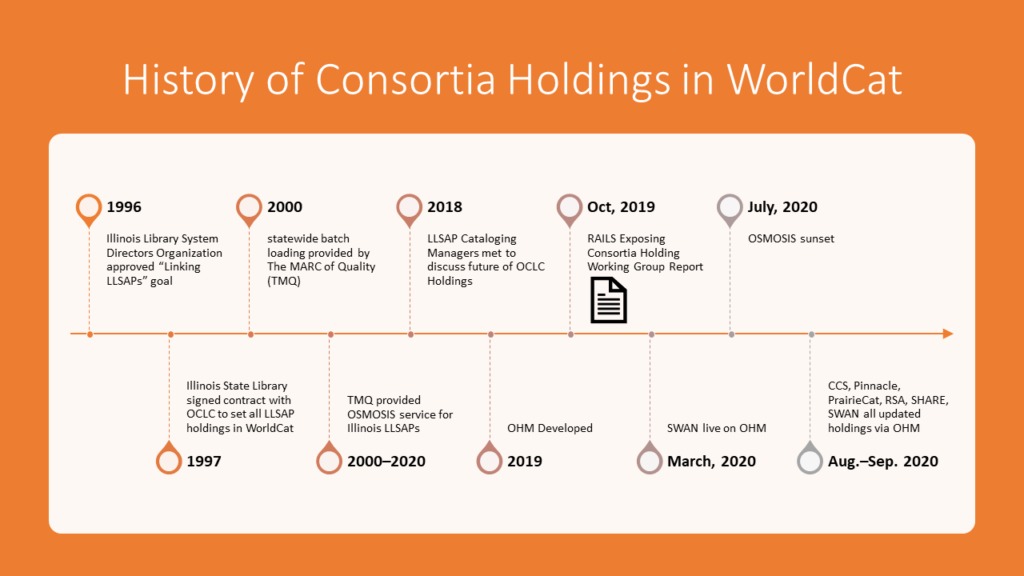
The process of creating what would become OHM started with Illinois consortium partners discussing what a new service would look like, and the opportunities for improving what had been a valuable 3rd party service. A typical month processing would set and unset WorldCat holdings for approximately 110,000 record adds and 165,000 record deletes. There is considerable churn within the six Illinois library consortia adding new titles and removing records no longer needed, so bulk updates to WorldCat required starting conversations with OCLC on the use of its set of Metadata APIs to accomplish this task.
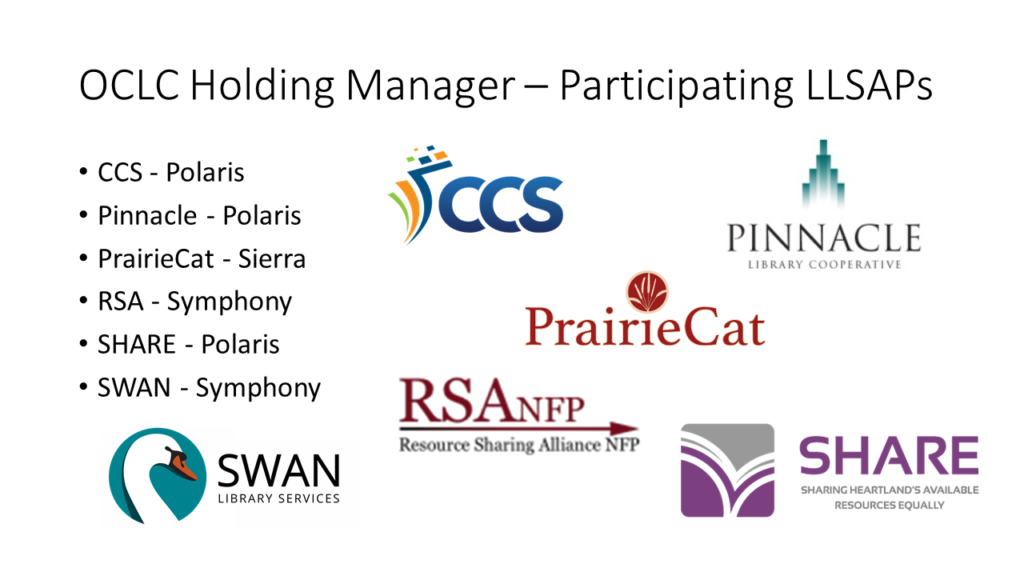
What OHM can do
For library consortia managing the WorldCat holdings of their libraries, OHM is a solution that can run with minimal requirements. The system utilizes a list of exported from the integrated library system, which is then uploaded into OHM. The system will compare that list to what had been uploaded prior, and from there it determines how it will perform adds and deletes within WorldCat for those member libraries.
OHM requires a local installation on a system supporting Python, which is configured by an administrator as specified on the project Github. SWAN is utilizing a Linux server in its cloud environment for OHM, but it is flexible in how an administrator of OHM decides what operating system should run OHM.
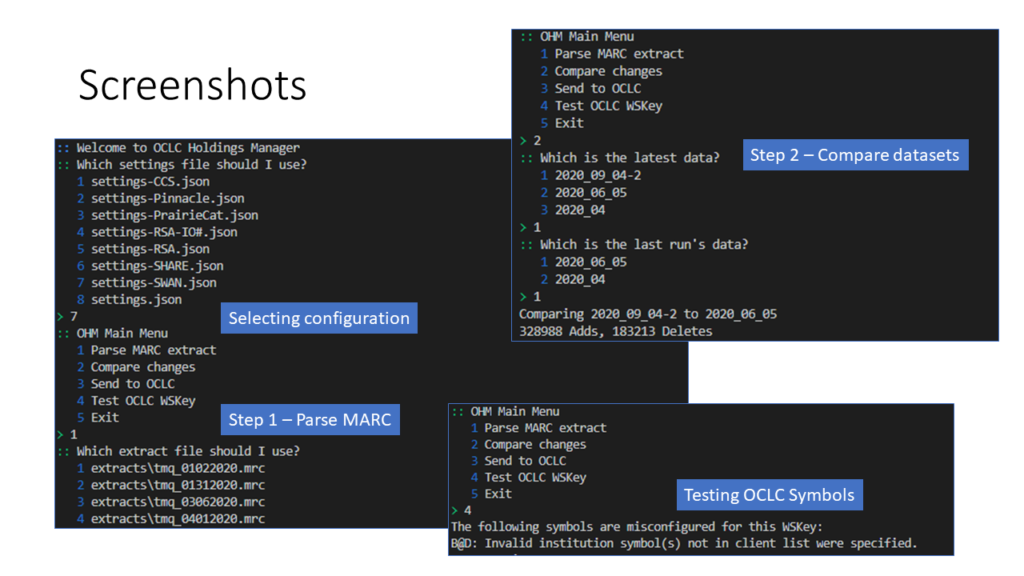
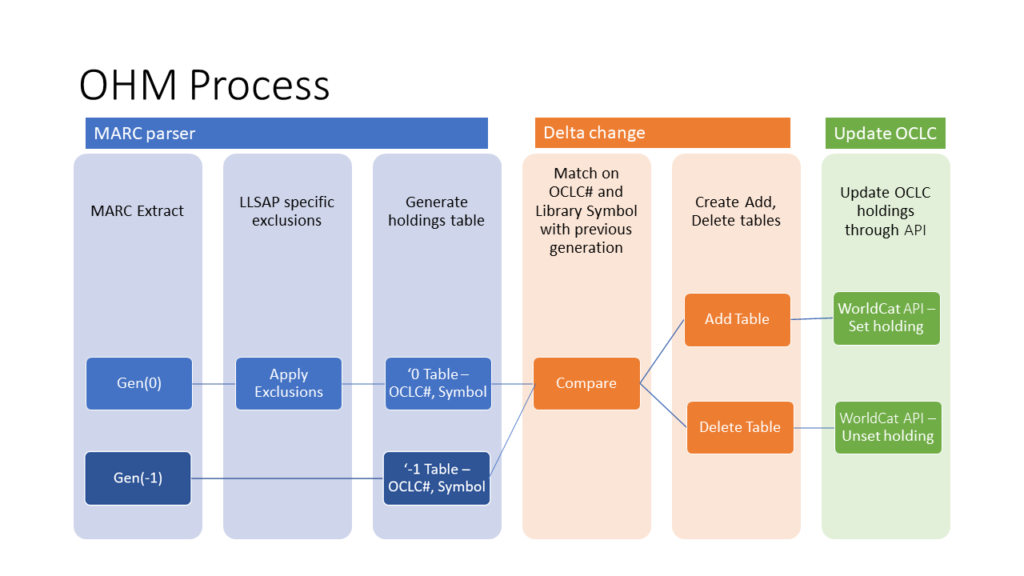
In addition to monthly holdings update, OHM has been used to facilitate a WorldCat reclamation when libraries are added to a consortium. Through use of OCLC Collection Manager, a snapshot of holdings for the library can be retrieved, feeding into OHM as delete holdings. With the next full run of the consortium catalog, the new library’s holdings are then set/updated.
OHM in full production
The software platform jointly developed among the six Illinois library resource sharing consortia is now in full production with monthly updates of OCLC holdings reflecting the most accurate representation of the library collections in WorldCat Discovery to-date. Six Illinois consortia holdings in WorldCat are updated monthly using a software platform. The monthly processing is coordinated by a group of SWAN employees, ensuring back-up and redundancy in support.
Acknowledgements
The creation of OHM is the result of individuals at Computer Cooperative Services, Pinnacle Library Cooperative, PrairieCat, Resource Sharing Alliance, SHARE, and SWAN coming together over the course of a year to discuss and design the OCLC Holdings Manager. The success of this project would not have been possible without the involvement of Bruce Crocco, Cynthia Wilson, and Don Litner at OCLC.
This overview uses visuals from the SWAN presentation of OHM at the Illinois Library Association 2020 virtual conference. The presentation by Dawne Tortorella, Rudy Host, and Scott Brandwein was not recorded or archived by the Illinois Library Association. These three individuals were instrumental in creating OHM.

Leave a Reply